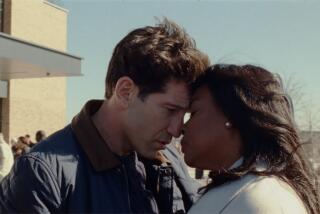A brave and wrenching new fictional world
- Share via
Eva Hoffman, who came to America as a 13-year-old in 1958, has made a name for herself writing thoughtful nonfiction books about subjects linked to her Polish and Jewish heritages. In “Exit Into History,” she described revisiting Poland and other Eastern European countries after communism’s fall, and in “Shtetl,” she painted a portrait of life in a vanished Jewish village. Her memoir “Lost in Translation” powerfully evoked her adolescent experience of suddenly being unable to communicate in her native language while struggling to gain her bearings in a new one.
And now in “The Secret,” Hoffman’s first work of fiction, she offers us a heroine with an identity crisis of quite a different kind. Iris Surrey is good-looking, blond, brimming with health, vitality and intelligence. Although she is the only child of a single mother, it’s hardly unusual to grow up in a single-parent household (Iris is born in 2005).
Her mother, Elizabeth, is well-to-do and just as attractive, blond, healthy and intelligent as Iris. Mother and daughter get on well. Almost too well. Iris sometimes senses a kind of “weirdness.” Digging through her mother’s files, Iris uncovers the secret within the first quarter of this novel, and it shouldn’t spoil the reader’s suspense too much to reveal what has been heavily hinted at from the story’s outset: Iris has no biological father. She is her mother’s clone.
What kind of woman would want to produce a daughter who was an exact genetic replica of herself? Elizabeth Surrey is a golden girl, a self-confident, selfish super-achiever who soars to the top of the heap in the investment game, then suddenly feels a lack.
Reciprocal relationships not being Elizabeth’s forte, she decides to go the cloning route. (In the story the procedure has only recently begun to be available to the public, but Elizabeth is nothing if not cutting edge.) Iris is stunned and appalled to learn the truth. Realizing she is her mother’s clone makes her doubt the reality of her own existence. She feels she is nothing but the “copy” of her mother’s “original.”
Unable to bear being with her mother, she rushes off to New York, where she hopes to find her mother’s parents and sister, estranged all these years by Elizabeth’s headstrong and highly questionable choice.
Hoffman painstakingly chronicles her protagonist’s struggle to regain her sense of selfhood and humanity, although Iris finds no easy answers to her predicament: “I’ll always veer between the suspicion that I’m a highly impressive piece of organic programming and the wrenching hope that within my identikit frame there beats something like a true human heart, and that this heart is also a psyche, a soul, a spirit.”
Hoffman uses Iris and her clone-hood as a means of discussing the mind-body question. But the mind-body problem would probably be no more of a problem for a clone than for a traditional twin or for any other human being. Any person might feel troubled by the thought that he or she is only a collection of cells, which have to some extent been pre-programmed by a genetic code.
The trouble (not Iris’, but the novel’s) is that the psychological and metaphysical problems that face Iris would be more suitable for a creation like Hal the computer in “2001: A Space Odyssey.” Iris, after all, is not a robot but her mother’s twin. Although identical twins often have relationships different from that of ordinary siblings, one seldom hears of a twin complaining like Iris about a lack of soul -- a lack of individuality, perhaps, but not of soul. Besides, even identical twins experience some differentiation by having different experiences. Surely, twins who were mother and daughter rather than sisters would experience much more of a different environment by virtue of being cast into different roles and living in different generations.
Which is not to deny Hoffman’s central point: that cloning is a potentially dangerous development and that someone in Iris’ position might well suffer from serious problems. Hoffman also provides some wise and humane answers to her heroine’s anguished existential questions: The pains, losses, joys and sorrows we all experience, our capacity for sympathy, grief, love and regret, are what make us into souls.
Still, one can’t help feeling these are the right answers to questions that have not been properly framed by this particular story. Hoffman does not treat what in all likelihood would actually be the serious consequences of cloning, which are not metaphysical or even psychological, but social, cultural and ecological. Iris, we are told, is not the only clone in this brave new world, merely one of the earliest. What would it be like to live in a world where untold numbers of identical beings could be produced? Would sexual reproduction become an anomaly, a thing of the past? Would the clones congregate in tribes and war with one another?
Ironically, one of the most prescient novels ever written about these matters was published in 1932: Aldous Huxley’s “Brave New World.” Only in our present moment, without the guiding hand of a centralized state to impose rationality and order on the process, a nation of clones created by nothing more than the vagaries of marketplace might make the well-oiled, pacified “Brave New World” look like a nice place to live.
*
The Secret
Eva Hoffman
PublicAffairs: 266 pages, $25
More to Read
Sign up for our Book Club newsletter
Get the latest news, events and more from the Los Angeles Times Book Club, and help us get L.A. reading and talking.
You may occasionally receive promotional content from the Los Angeles Times.










